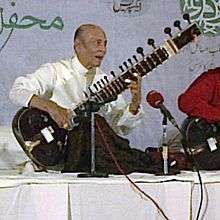Rais Khan
| Rais Khan (sitar player) | |
|---|---|
 | |
| Background information | |
| Born | 25 November 1939 |
| Origin | Indore, Madhya Pradesh, British India |
| Genres | Hindustani classical music |
| Years active | 1948 – current year |
Ustad Rais Khan (born 25 November 1939) is a Pakistani sitarist from Karachi, Pakistan.[1][2]
Career
Rais Khan is the torchbearer of the Mewat or Mewati Gharana (lineage), which is connected to Indore and the "beenkar baj gayaki ang" (singing style combined with rudra vina approaches) carried out by Rais Khan's father Mohammed Khan, a rudra vina (been) player and a sitarist. Despite his extensive meend work and the gandhar pancham sitar style he uses, Rais Khan's alapi, gatkari and gamaki work is different in approach, pacing, and even technique, from the Etawah style. Amongst the Khayal and dhrupad doyens, Rais Khan's gharana is a lineage containing the masters Haddu Khan, Hassu Khan, Bande Ali Khan, Nathan Khan, Babu Khan, Wazir Khan, Waheed Khan, Murad Khan, Latif Khan, Majid Khan, Nazeer Khan, Amanat Khan and Rajab Ali Khan of Dewas, Madhya Pradesh, India.[3]
As Rais Khan's mother was a singer and his father was a beenkar, a unique combination of khayal (the most popular classical vocal style), dhrupad (the older and most orthodox classical form) and thumri (lyrical semi-classical form) – 'angs' (approaches) developed in his playing.[4]
He gave his first public concert at Sunderbai Hall in the presence of the then Governor of Bombay Sir Maharaja Singh.[5]
He is also a vocalist and is the first sitar player to record the super-hit geet 'Ghungroo toot gaye' for BBC London in 1978 as an instrumental song with the sitar. This song was originally written by Qateel Shifai, music by Nisar Bazmi for a Pakistani film Naz (1969).[6] Like his uncle Ustad Vilayat Khan, he often sings and demonstrates compositions by his accompanying sitar playing. Ustad Rais Khan (sitar player) and the great Bismillah Khan (shehnai player) used to get together and do live concerts together as a duo, called 'Jugalbandi' as they did in a live concert in New Delhi on 23 November 2001.[7]
He has been touring extensively throughout the world.
For sometime, Khansaheb had stopped playing concerts of classical music. He returned in the 1980s and was invited by Ali Akbar Khan to perform in California.
Rais Khan moved to Pakistan after marrying a Pakistani singer named Bilqees Khanum. He has four sons: Suhael Khan, Cezanne Khan, Farhan Khan and Huzoor Hasnain Khan. Farhan often performs with his father as he did in a 2009 performance for Pakistan Television (PTV) produced TV show 'Virsa- Heritage Revived', accompanied by Ustad Tari Khan on tabla.[8]
Awards
Rais Khan was awarded the Pride of Performance Award by the President of Pakistan in 2005.[9]
References
- ↑ "Family feud turns into cross-border musical war"., mid-day.com newspaper website, Retrieved 24 January 2016
- ↑ "'Today, music is about cloning'". The Hindu newspaper. 29 October 2005. Retrieved 24 January 2016.
- ↑ Amit Adiecha – "History of Sitar," and the CD "Melodious Sitar of Rais Khan" – Chhanda Dhara 1993
- ↑ https://books.google.com/books?id=PlNShmx3x68C&pg=PA173&lpg=PA173&dq=rais+khan+%2B+thumri+%2B+ghazal&source=bl&ots=ZYAnOGeh0L&sig=zmZpPFKB3_AasdT1iX6pAW-yZo8&hl=en&ei=IMrzS5GrNYTGlQezz4ivDQ&sa=X&oi=book_result&ct=result&resnum=3&ved=0CA4Q6AEwAg#v=onepage&q=rais%20khan%20%2B%20thumri%20%2B%20ghazal&f=false, Thumri in historical perspective, Google Books, Retrieved 24 January 2016
- ↑ http://www.icmcdfw.org/bios/raisKhan.htm, Rais Khan profile, Retrieved 24 January 2016
- ↑ https://www.youtube.com/watch?v=6dUJUbuGXZM, Original song 'Ghunghroo' on YouTube, Retrieved 26 January 2016
- ↑ https://www.youtube.com/watch?v=eNguGqgp758, Rais Khan and Bismillah Khan 'Jugalbandi' concert, 23 November 2001 at New Delhi on YouTube, Retrieved 26 January 2016
- ↑ https://www.youtube.com/watch?v=hXVRU6zwlAU, Rais Khan sitar performance on 'Virsa- Heritage Revived' PTV show in 2009, Retrieved 26 January 2016
- ↑ http://www.tehzeebfoundation.org/artist.html, Rais Khan awarded Pride of Performance award in 2005, Tehzeeb Foundation website, Retrieved 24 January 2016
| Pride of Performance Recipient | |
|---|---|
| Date | 2005 |
| Country | Pakistan |
| Presented by | Pervez Musharraf, President of Pakistan |